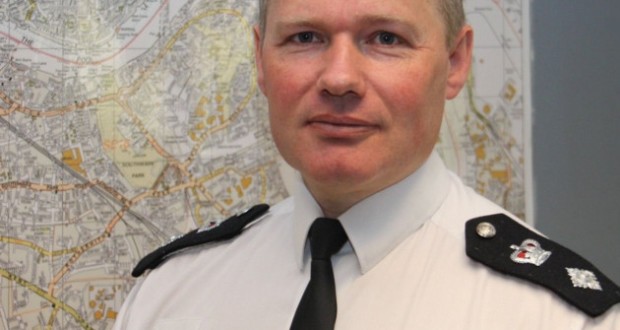Elderly and vulnerable Londoners were warned against falling victim to courier fraud on Wednesday, 4th June as part of Courier Fraud Awareness Day.
Between April 2013 and April 2014, Tower Hamlets Police received 43 reports of courier fraud. Borough Commander Dave Stringer said: “These 43 crimes represent 43 people from among the most vulnerable in our community who are now faced with the effects of becoming a victim of crime. As well as the financial loss, they are also left with the feeling of insecurity that in some cases may last forever.
“My officers, working with our borough partners, will continue to pursue these unscrupulous criminals while also raising awareness among those people who could be potential victims. Please help us by making sure that anyone you know who may be vulnerable to courier fraud is aware of this scam.”
As part of the London-wide operation to raise awareness of courier fraud, officers from Operation Sterling, the Metropolitan Police’s fraud prevention team, worked together with Ofcom, the DCPCU (Dedicated Cheque and Plastic Crime Unit), Trading Standards and high street banks, including Natwest, Barclays and Santander, to advise on how to avoid becoming a victim of fraud. They also distributed an updated edition of the MPS publication ‘The Little Book of Big Scams’’.
Courier fraud is a sophisticated fraud where scammers telephone the victim purporting to be someone from their bank, the police or other law enforcement agency. They then dupe the person into revealing their PIN and handing over their credit or debit card to a courier or taxi driver, who may not know they are being used as part of the scam. The victim may be asked to ring the number on the back of their card, thereby further convincing the victim that the call is genuine, however the scammer keeps the line open so that the victim unknowingly talks to another member of the gang, posing as a bank employee.
In the last year, the percentage of unsuccessful offences (where a call is made but a credit/debit card is not handed over) has increased to from 40% to 76% of all courier fraud calls reported to police. Officers believe this success is due to a combination of intensive efforts by Ofcom and the telecommunications industry to cut the amount of time taken to disconnect a call, and increased public awareness of the scam.
Despite these advances, police are warning people to be on their guard as criminals work ever harder to defraud their victims. 2556 courier fraud offences were reported to the MPS between April 2013 and March 2014 and the crime continues to evolve. Variations of the crime include:
•asking the victim to assist in a police investigation (the victim is requested to withdraw a large sum of cash and take it home, where it is then collected by a courier);
•being told there is a corrupt member of staff within the bank and asking for help in identifying them (the victim is told to withdraw a large sum of money which will be “marked”, with the purpose of it being placed back into the banking system and a taxi driver is sent round to collect the cash).
As part of Courier Fraud Awareness Day, officers have advised the elderly and vulnerable to be aware of the following:
•police and banks will never ask for your PIN or bank card;
•never give your PIN or bank card to anyone;
•if you are contacted by someone who asks for these, hang up;
•use a different line to report the call to police on 101 or allow at least five minutes for the line to automatically clear;
•call 999 if the crime is in action.
Detective Chief Inspector Gary Miles of SCO9, Specialist and Economic Crime Command, said: “Much has been done in the last year to tackle courier fraud, but scammers are always looking for new ways of defrauding the elderly and vulnerable, and the crime continues to evolve. It is vital that people stay vigilant. Courier fraudsters put a huge amount of time and effort into being convincing because the pay-off is immense. This is a massive part of what makes them so successful. We want people to question even truly genuine sounding calls and, most importantly, remember police and banks will never ask for your PIN or bank card, so you should never give these away.”
Since the start of 2014, the following boroughs have been hardest hit by courier fraud, all of which are outside east London:
•Barnet – 115 offences;
•Ealing – 83 offences;
•Kensington & Chelsea – 50 offences;
•Bromley – 47 offences;
•Croydon – 47 offences.
Between April 2013 and March 2013, the average age of a victim was 54 and nearly two thirds of victims were female. The average loss in “complete” offences was approximately £2,600 per offence. In addition, police seized nearly £48,000 in relation to courier fraud under the Proceeds of Crime Act 2002.
Lynn Parker, Ofcom’s Director of Consumer Protection, said: “Ofcom is working closely with the police and the telecoms industry to help stamp out courier fraud. Over the last year, a number of telephone providers have made changes to their networks to cut the time a phone line remains open to a couple of seconds. This action has stopped fraudsters from being able to stay on the line to impersonate a victim’s bank or the police – a key feature of how this scam works. We have also been working to drive awareness among consumers to help them avoid falling victim to courier fraud.
“It’s very encouraging to see this work paying dividends, with more fraudsters being foiled in their attempts to scam people. But we’re fully aware that there’s more work to do to prevent courier fraud completely. We are continuing our work in this area to ensure that the necessary technical changes are fully implemented across the telecoms sector as quickly as possible.”
Detective Chief Inspector Perry Stokes, Head of the Dedicated Cheque and Plastic Crime Unit, said: “Fraudsters can be extremely persuasive – do not be fooled. Your bank or the police will never call you to request your bank card or ask you to transfer money to another account. Anyone attempting to do so is a fraudster. If someone on the phone asks for it, hang up immediately. If you believe you have had one of these calls or know someone who has, get in contact with your bank straight away.”
Further initiatives that took place across London under Courier Fraud Awareness were:
•local police distributing the Little Book of Big Scams in high street banks including Natwest, Barclays and Santander;
•officers giving presentations to local elderly residents and liaising with charities such as Age UK and Silver Line to advise how to avoid becoming a victim of courier fraud;
•officers running fraud prevention stalls at transport and community hubs;
•follow-up visits to victims and visit potential victims;
•visits to cab and courier firms to advise on spotting courier fraudsters.
The Little Book of Big Scams can be downloaded here: http://www.met.police.uk/docs/little_book_scam.pdf
If you have information about courier fraud or any other crime please contact police by dialing 101 or call Crimestoppers anonymously on 0800 555 111. The Crimestoppers guarantee of anonymity has never been broken and callers are not even asked for their name. If a crime is in action, call 999.
 East London News A Force for the community…
East London News A Force for the community…




